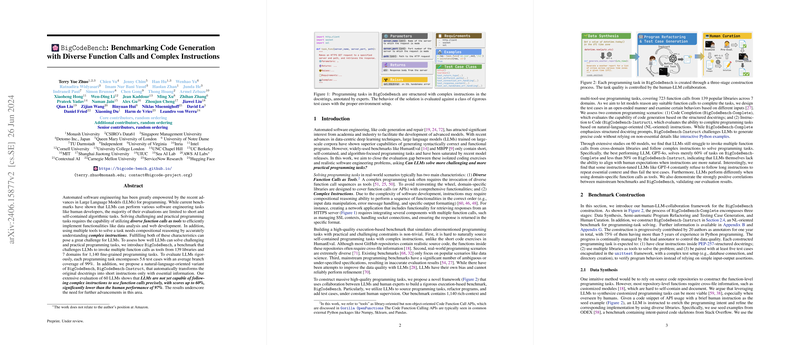Evaluating LLM Capabilities with BigCodeBench
The paper presents BigCodeBench, a novel and rigorously structured benchmark designed to evaluate the ability of LLMs to tackle complex and practical programming tasks. It focuses specifically on two critical aspects: employing diverse function calls from domain-specific libraries and following intricate instructions requiring compositional reasoning.
Construction and Importance of BigCodeBench
The authors identified a gap in current benchmarks, such as HumanEval and MBPP, which primarily feature short, self-contained algorithmic challenges that models have begun to saturate. These tasks do not adequately simulate the complexities encountered in realistic programming environments. Thus, BigCodeBench was assembled to bridge this gap, featuring 1,140 tasks that demand the use of function calls from 139 libraries across seven domains. This benchmark necessitates LLMs to perform real-world programming tasks, focusing on practical applications like web development and data analysis.
BigCodeBench stands out because it not only requires an understanding of algorithms but also tests how effectively LLMs can integrate and apply external libraries to solve problems—mirroring practical software engineering scenarios. The usage of extensive debugger-like evaluations (5.6 test cases per task with 99% branch coverage on average) ensures that the model thoroughly understands and solves the given tasks.
Evaluation of LLMs
The benchmark assesses both instruction-tuned and base LLMs, measuring performance using the unbiased Pass@ metric. A key discovery is that while LLMs are proficient in certain domains, their performance on BigCodeBench tasks is far from human-level, with the best models scoring approximately 60% compared to human performance at 97%. This discrepancy not only highlights the complexity of the tasks but also suggests areas where LLMs require improvement.
Observations and Findings
- Model Scaling and Performance: Higher parameter counts generally correlate with improved performance, showcasing characteristics of scaling laws in LLM training.
- Closed vs. Open Models: Proprietary models like those from OpenAI and Anthropic generally outperform open-source alternatives, with GPT-4o leading in performance.
- Domain-Specific Challenges: LLMs excel in domains such as computation and cryptography but struggle with others like networking, indicating areas where models could benefit from domain-specific tuning.
- Instruction Following: A notable challenge for LLMs is accurately following detailed instructions for complex tasks. Instruction tuning improves performance, but there remains a significant gap to bridge.
Future Work and Implications
The research underscores the necessity for enhanced LLMs with better generalization abilities and improved instruction adherence. The authors propose continuous development of BigCodeBench to include emerging libraries and tasks, and suggest exploring more dynamic environments where LLMs function as agents interacting with different tools and services.
By addressing these gaps, the paper not only highlights the current capabilities and limitations of LLMs in software engineering applications but also sets a foundation for future advancements in the field. The introduction of BigCodeBench is poised to guide researchers and developers toward the development of more robust and versatile LLMs capable of undertaking real-world software engineering challenges.
